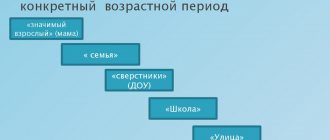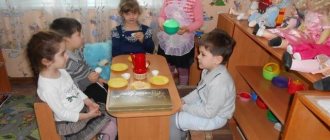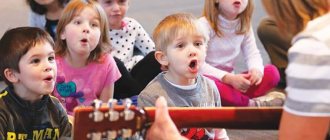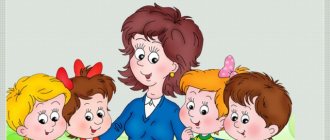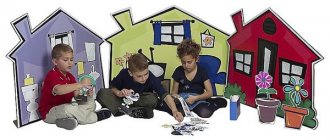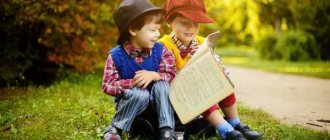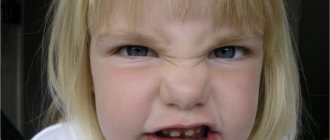Finger games
Social and communicative development classes in the senior group of preschool educational institutions include finger games. They contribute to the formation of fine motor skills, which is important in the junior and middle groups for the development of speech, and in the senior and preparatory groups - for preparing the hand for writing. In addition, such games perfectly develop reaction, flexibility and memory:
- Junior group. “1, 2, 3, 4, 5, let’s go for a walk! 1, 2, 3, 4, 5, they hid in the house again.” (All fingers, without exception, are extended one by one, starting with the little finger, and then bent in the same order).
- Middle group. “Like our cat has boots on her feet. Like our pig has boots on his feet. And the dog has blue slippers on his paws. And the little goat puts on felt boots. And son Vovka - new sneakers. That's it, that's it, new sneakers." (“Walk” with index and middle fingers on the table).
- Senior group. “Finger-boy, where have you been? “I went to the forest with this brother, I cooked soup with this brother, I ate porridge with this brother, I sang songs with this brother.” (Bend fingers one by one.)
- Preparatory group. “We met 2 cats: “Meow-meow!”, 2 puppies: “Aw-aw!”, 2 foals: “Igo-go!”, 2 tiger cubs: “Rrr!”, 2 bulls: “Moo!”. Look at the horns." (Demonstrate horns with index fingers and little fingers extended).
Problems of development of communication in modern children
But the main task of preschool communicative development is to awaken in the child the desire to communicate.
As you know, communication is the most important need of a person, without which he ceases to be a person; It is the ability to interact with each other that is the peculiarity of human civilization. Without communication, it is impossible to communicate socially, to find your place and purpose in life. This is the foundational activity for all other activities.
Play and communicative development are interconnected
The concept of effective communication consists of 4 components:
- desire to interact with people around you;
- know the norms and rules of behavior, perceive social roles in society;
- be able to communicate, listen, perceive emotions, conscious and unconscious signals from other people;
- resolve any conflicts in communication.
Despite the fact that all this seems quite natural, in the modern world the number of young children with problems in the development of communication skills is increasing.
Speech therapy games will help improve speech communication
This leads to the fact that the behavior of preschoolers becomes increasingly unbalanced: they are unable to take control of their emotions, communicate normally with peers, master speech, etc. All this, of course, affects the development of intellectual abilities and leads to a frightening lag in the normal development of all greater percentage of children.
Outdoor games
In the younger group, the emphasis is on developing the skill of jumping correctly, performing actions to the sound of the text. For example, the game “Run to Me”: the guys sit on chairs, the teacher is located at the other end of the room. To the phrase “Run everyone to me!” The children run up to the teacher, who greets them affectionately. To the phrase “Run to your place!” the guys will return to the chair.
In the middle group, the goals of outdoor games are considered to be the formation of endurance in running, climbing, and jumping. The game “Fox in the Chicken Coop” can be played both indoors and outdoors. On the benches (“in the chicken coop”) there are children (“chickens”), on the opposite edge of the room there is a fox hole, the role of which is played by a child or an adult. Chickens walk around the yard, when they hear the signal “Fox” they are obliged to run away, at this time the fox tries to detain the unwary chicken and take it into its own hole. If she succeeds, the child leaves the game.
In the senior and preparatory groups, the goal of outdoor games is considered to be the formation of endurance and skill in coherently carrying out actions as a whole team. Here is an example of an outdoor game for older preschool age - the game “Quickly Take It”: pine cones, chestnuts or other small objects are scattered on the floor around the children, but there is one less piece than the number of players. According to the signal "Quickly take it!" the guys bend down and take the object. The one who does not have enough suffers defeat. Outdoor activities can be done both in a group and on the street.
Didactic
In the younger group, the game “Let’s teach the bunny to speak competently” is used to develop intonation expressiveness. Its essence is that a visitor comes to class - a little bunny, who distorts phrases, for example, the names of animals (“donkey” instead of “bear”, “ot” instead of “cat”). The guys correct the bunny by speaking phrases correctly.
To teach how to compare geometric objects, use the game “Find an Object”: the children stand in a circle, the teacher throws a ball to the baby, shows an illustration of a geometric figure, the baby names it and looks for a similar object.
The team often uses the game “Who Says What,” the goal of which is to identify domestic and wild animals. Its essence lies in the fact that an adult, throwing a ball to one of the children standing in a circle, names the animal. The kid gives the ball and says how this animal “talks” (the predator growls, the dog barks, etc.).
Responsible parents are the key to a child’s successful development!
That is why the timely assistance of preschool education workers is of fundamental importance - you need to send your children to special institutions on time and actively support their socialization.
The fact is that this process directly depends on the influence of parents, whom the child trusts absolutely. It is the influence of parents that is primary in relation to the social development of their child. Research and statistics show that if the mother and father are responsible and competent, then the preschooler himself is much more actively involved in social life and interaction with people.
Communication with a child in the family is the basis of social and communicative adaptation in society
Also, and vice versa: a low level of speech development arises primarily due to insufficient communication in the family, the so-called “personal experience”. This affects the intellectual and creative development of preschool children.
Thus, it becomes clear that the work of parents and educators in institutions is of equal importance for the social and communicative development of children. Moreover, these two points are closely interrelated with each other.
Successful results in the development of social and communication skills in preschoolers lay the foundation for unlocking creative potential, finding their place in the world and building success in life.
leave a comment
The elements of effective communication include
- desire to interact with others;
- the ability to organize communication - listen to the interlocutor, empathize emotionally, resolve conflict situations;
- knowledge of the norms and rules that must be followed when communicating with others.
The implementation of the tasks of social and communicative development of preschool children is aimed at gaining experience in various types of children's activities .
- Playful activities make the child feel like an equal member of human society. In the game, the child gains confidence in his own abilities, in the ability to get real results.
- Research activity allows the child to independently find a solution or refutation of his own ideas.
- Fine - allows the child, with the help of work and imagination, to get used to the world of adults, get to know it and take part in it.
- Subject-based – satisfies the child’s cognitive interests at a certain period, helps to navigate the world around him.
- Observation enriches the child’s experience, stimulates the development of cognitive interests, gives rise to and strengthens social feelings.
- Communicative (communication) – unites an adult and a child, satisfies the child’s various needs for emotional closeness with an adult, for his support and evaluation.
- Project - activates the child’s independent activity, ensures the unification and integration of different types of activities.
- Constructive – makes it possible to form complex mental actions, creative imagination, and mechanisms for managing one’s own behavior.
Thus, each type of activity contributes to the process of social and communicative development of preschool children.
The specificity of preschool age is that the social development of a child is carried out under the influence of an adult who introduces the child into society. The child cooperates with competent adults; as a member of society, he is included in the system of human relations, where a dialogue of personalities and value systems takes place. The development of patterns and norms of behavior and the search for correct life attitudes occurs in preschoolers in interaction with peers, teachers, and parents.
Before starting classes on the development of communication skills, as well as subsequently, it is important for teachers to diagnose the communicative development of preschoolers. It consists of conducting a conversation with children, observing them as they complete a task, using preschool didactic material. Communicative development is assessed according to three criteria:
- The child’s knowledge of the rules of communication with people.
- How willingly the child communicates.
- The extent to which a child can listen, resolve conflict situations, and how empathic he is.
Each of these three criteria is assessed using a point system, and as a result, communicative development is assessed at one of three levels: high, low or average.
Children aged 2-3 years are just beginning to master communication skills. A good activity option for them would be to role-play a situation involving going on a visit .
Topic: “To the bunny’s birthday.”
Goal: familiarization with the rules and norms established in society.
Equipment: laptop; loudspeakers; recording a song; toy car; bunny toy; toy gift.
Conditions for personality formation
The concept of “social-communicative formation” establishes conditions that have a great influence on the development of the growing personality:
- family (personal characteristics of an individual, such as character, habits, are formed by heredity and the actions of elders in the family);
- environment (the formation of character, the selection of interaction methods are also determined by the fact that the child observes the boundaries of the house);
- education (a combination of methods of influencing the individual from the family and preschool education).
